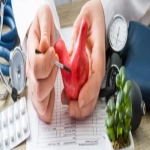6 Warning Signs of Gastric Cancer
According to the National Cancer Institute, stomach cancer is the fifth most common type of cancer in the world. Each year, more than 7 in 100,000 people are diagnosed with the disease, while 3 in 100,000 die from it. About 0.8% of all men and women will be diagnosed with stomach cancer at some point in their life.
Stomach cancer begins in the lining of the stomach and can spread rapidly to other parts of the body. While the cause of stomach cancer is unknown, there are a number of risk factors that may increase your chances of developing the disease. These include a family history of stomach cancer, being over 60 years old, smoking, and having a diet low in fruits and vegetables.
Early warning signs of gastric cancer can be vague and easily mistaken for other ailments so it's important to be aware of them. If you experience any of the following symptoms, be sure to talk with your doctor:
1. Heartburn
One of the most common symptoms of gastric cancer is heartburn. This is because the cancer can grow and block the exit from the stomach, causing fluid to back up into the food pipe/esophagus. This can lead to pain and discomfort, as well as other problems like difficulty swallowing. If you have prolonged heartburn that doesn't go away with antacids or other medications, it may be a sign that you have gastric cancer and you should see your doctor for evaluation.
2. Bloating
Gastric cancer can cause bloating because the tumor can grow to a size that takes up space in the stomach, preventing food from being digested and causing the stomach to become enlarged. In some cases, the cancer may also spread to the lining of the abdomen, which can lead to an accumulation of fluid. This extra fluid can cause the stomach to swell and result in bloating.
3. Indigestion
Indigestion, also known as dyspepsia, occurs when the cancerous tumor interferes with the normal functioning of the stomach, resulting in a build-up of digestive acids. Over time, this can lead to inflammation and irritation of the lining of the stomach, as well as ulcers and bleeding. As a result, indigestion is often one of the first signs that something is wrong. While indigestion can be caused by many different conditions, it is important to rule out stomach cancer as a potential cause.
4. Nausea and vomiting
The exact cause is not known, but it is thought that the cancerous cells release substances that interfere with the normal digestive process and cause nausea. This can lead to inflammation and irritation of the stomach lining, as well as blockages in the intestines. As a result, patients may experience abdominal pain, cramping, and nausea. Vomiting may occur if the blockage is severe enough to prevent food or liquids from passing through the stomach.
5. Loss of appetite
Loss of appetite can be caused by a number of factors, including the physical size of the tumor, obstruction of the stomach or intestines, and exacerbated by other symptoms such as nausea, and fatigue. Regardless of the cause, a loss of appetite can lead to other, more serious issues like weight loss and malnutrition. Consequently, it is important for people with stomach cancer to work with their healthcare team to develop a plan to maintain their nutrition and weight.
6. Bloody stools or vomit
The cancer cells can cause inflammation and ulcers, which can lead to the production of blood that mixes with stomach contents and is expelled from the body. This can show up as either black, tarry stools, or bright red blood in vomit or stool. Bloody stools or vomit can also be caused by other conditions, such as gastritis or ulcers, so it is important to see a doctor for a diagnosis.
Allied Digestive Can Help
If you're experiencing any of the early signs of gastric cancer, it's important to reach out to a qualified medical professional as soon as possible. At Allied Digestive, our team of experts is dedicated to providing comprehensive care for patients with all types of gastrointestinal disorders. We offer a full range of diagnostic and treatment options, and we're here to answer any questions you may have about your condition. Don't delay in getting the help you need - contact Allied Digestive today.

